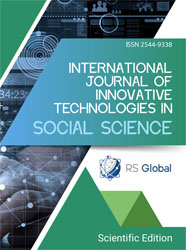PERCEPTION OF HATE SPEECH IN THE OF FREEDOM OF SPEECH CONTEXT - GEORGIAN MEDIA CULTURE EXAMPLE
Abstract
Hate speech, generally, is considered an expression of intolerance towards a definite group, and very often such communication provokes a kind of violence. Stimulation of abhorrence refers to a group of persons determined on the basis of race, ethnical identity, nationality, gender, religion, or sexual orientation, as a rule, it refers to minorities. However, all countries have their own unique contexts that complicate a vivid determination of so called “hate speech”. In some cases, all kinds of negative expressions being humiliating, insolent, slanderous, or discriminative ones towards anybody are perceived by the community and/or separate groups as hate speech. Unclearness of perceiving the hate speech was demonstrated by discussions on media regulation in Georgia held in 2019 when the government expressed a desire, motivated by the necessity of regulation of the hate speech, to change a system of media self-regulation existing in Georgia. Many initiatives were expressed and they were targeted to make the hate speech applied in media punitive and regulatory. The research is conducted using a qualitative methodology. We have analyzed a practice of self-regulation of the hate speech in Georgia within the year 2019, and selected cases that were high-sounding in TV media outlets resulted in broad discussions and which had been discussed by the self-regulatory authorities. In addition to analyzing of the cases and observing decisions made by the self-regulatory authorities, we have also used a method of profound interviews. As we have mentioned above, we have selected two high-sounding cases in the most interesting period of the research (2019). For both periods of the research, it was an author text of the anchor man of the national broadcasting company “Rustavi 2”. The first case was considered personally by the self-regulation council of the Rustavi 2 as well as by the Georgian Charter of Journalistic Ethics. We have analyzed two different approaches applied by both self-regulatory councils. We received similar results of radically different interpretations of self-regulatory authorities as a result of conducting deep interviews. Representatives of parties consider that the text expresses a hate speech towards Christians, but representatives of civil organizations and academic fields of universities do not consider that the text had been discriminative towards anybody. One of the explanations was as follows: “The given example is unlikely in compliance with a definition establishing the hate speech. It represents a subjective opinion of a definite journalist. I think that it does not collide with constitutional norms of freedom of speech, neither is considered a humiliating act against religious feelings as the religious passage was devoted to the discretion of a definite politics and not for the discrimination of this confession. Analyses of both examples demonstrated that understanding and perception of the term hate speech are not clearly formed neither in general society nor in professional circles of Georgia. The hate speech is often put on the same level as the humiliating and indecent expressions. Approaches and explanations of media self-regulatory boards are quite different. The present research partially confirmed a hypothesis that stakeholders interpret hate speech with a broad understanding which considers indecent and humiliating expressions. It was also completely confirmed that interpretation and regulation of hate speech with a broad understanding in practice bears definite risks for freedom of media in fragile democracies.
References
Mediachacker (2019) Protecting society from slander or trying to restrict freedom of expression? https://bit.ly/31IC4sn - last visited on 21.03.2020.
Georgian Charter of Journalistic Ethics (2019) Fighting Hate Speech - Guidelines for the Media - https://bit.ly/3oGk0dC last visited on 21.03.2021.
Bertrane (2004) Media, Ethics and Accountability Systems (Quality Control). Georgian Translator: Manana Gigauri. Freedom Institute. Tbilisi. (Chapter 3).
UNESCO (2015) - Countering online hate speech –https://unesdoc.unesco.org/ark:/48223/pf0000233231 - last visited on 1.03.2020.
Press Council of India (2010) Norms of Journalistic Conduct - http://presscouncil.nic.in/OldWebsite/NORMS-2010.pdf - last visited on 15.03.2020.
Georgian Democratic Initiative (2018). Eliminating Hate Speech in Political Discourse - From criminal liability Towards self-regulatory mechanisms. https://gdi.ge/uploads/other/0/192.pdf - last visited on 13.03.2020.
N. Kuprashvili (2017) The Audiovisual Mediascape in Georgia and Cooperation with Europe - https://bit.ly/3DJ22vp - last visited on 6.04.2021.
Hallin, Mancini (2004/2012) “Comparison of media systems”. Cambridge University Press. ISBN:9780511790867 (Chapter 5).
Mariam Bogveradze (2018) Netgazeti. Rustavi 2 apologizes for joking about Christ, Gabunia reprimanded https://bit.ly/2YZIy4l - last visited on 6.04.2020.
Georgian Charter of Journalistic Ethics (2018) Case Decision - Tornike Kakalashvili v. Giorgi Gabunia -https://www.qartia.ge/ka/gadatsyvetilebebis-dzebna/article/50231-gadatsyvetileba-saqmeze-thornike-kakalashvili-giorgi-gabunias-tsinaaghmdeg - last visited - 4.04.2020.
Dato Kokoshvili (2018 (Netgazeti. If I exist, can I apologize for that?! - Giorgi Gabunia - https://netgazeti.ge/news/261530/ - last visited 5.04.2020.
Rustavi 2 (2019) "Rustavi 2": The self-regulatory body suspended the authority of Giorgi Gabunia for 2 months http://rustavi2.ge/ka/news/138514 - last visited on 5.04.2020.
Views:
355
Downloads:
228
Copyright (c) 2022 Natia Kuprashvili, Nino Chalaganidze

This work is licensed under a Creative Commons Attribution 4.0 International License.
All articles are published in open-access and licensed under a Creative Commons Attribution 4.0 International License (CC BY 4.0). Hence, authors retain copyright to the content of the articles.
CC BY 4.0 License allows content to be copied, adapted, displayed, distributed, re-published or otherwise re-used for any purpose including for adaptation and commercial use provided the content is attributed.














